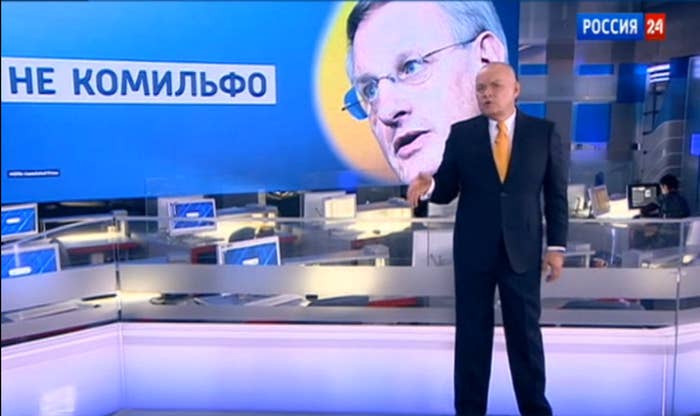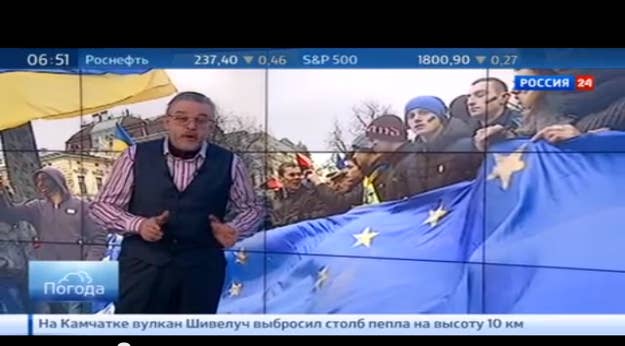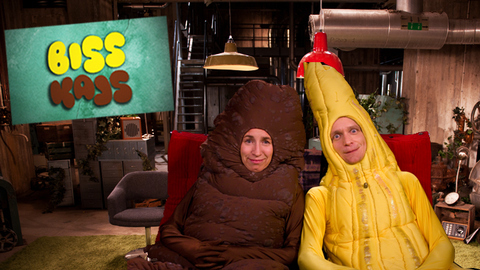
KIEV, Ukraine — Nobody can have been more taken aback by the huge anti-government protests that sprung up here over the weekend than Russians who get their news from state television. As President Viktor Yanukovych mulled signing a deal with the European Union in November, Russian channels insisted that the agreement was of no use to Ukraine, which was "just a means" for the West to strike at the Kremlin, the only party that could help Kiev avoid a crippling foreign debt crisis. When Yanukovych abruptly backed out of the deal before a summit in Vilnius last week under heavy Russian pressure, presenters could barely conceal their glee at seeing Ukraine return to Moscow's sphere of influence.
"The best thing that could happen to you in historical perspective," radio host Sergei Dorenko said, "is for a German to stand over every Ukrainian with a lash and start yelling 'Arbeiten, schnelle schnelle.' I think that's your destiny, my dear brothers - to be a rotten backwater."

When hundreds of thousands of Ukrainians decided otherwise last Sunday and took to the streets to protest a violent police breakup of a tent city, pro-Putin news anchors scrambled for answers. The Rossiya channel claimed the protesters were funded and trained by the U.S. State Department, then showed an edited clip from Ukrainian TV to suggest a man admitting he had been paid to attend a pro-Yanukovych meeting had actually gone to a pro-EU protest. NTV, famous for pseudo-documentary hit pieces on the opposition, said the march was full of "professional revolutionaries, for whom organizing riots is a job."
Meteorologist Vadim Zavodchenkov took the scientific approach on Rossiya 24. "Disturbances are continuing in Kiev. They started on exactly the same day the Orange Revolution did nine years ago," he began. "Yet again, the dramatic worsening of the political climate has coincided with a transitional period between seasons."
According to Zavodchenkov, scientists in Russia and at Columbia University have found that bad weather "provokes people to start conflicts." He then went through a forecast. Temperatures and Kiev had fluctuated above and below freezing all weekend. Atmospheric pressure was getting worse. A warm wind from the Baltic would be supplanted later in the week by cold weather from the north, he said: "the blizzards and frosts that hit Moscow and Central Russia will reach the Dniepr too." After all, he said, Ukrainians should remember that standing outside in cold temperatures for long periods is a heath hazard.
The most esoteric interpretation, however, came from Rossiya's Dmitry Kiselev, a weekend anchor famous for his tirades against gays, for his love of comparing the Kremlin's enemies to the Nazis, and for his manic jazz hands. Kiselev started off by likening the Vilnius summit to the Munich agreement of 1938, where Allied powers allowed Nazi Germany to annex the Sudetenland in Czechoslovakia. "The only difference," he said, "is that today's goal is to deprive Russia of its allies, and tear Ukraine away."
Then he listed the countries at the heart of EU attempts to bring Ukraine into the fold. "Sweden, Poland, Lithuania – does that sound familiar?" he asked. "It's the same alliance Peter the Great defeated at Poltava in 1709. Amusing as it sounds, it now looks like they want revenge for Poltava," a city in central Ukraine. Swedish Foreign Minister Carl Bildt, Kiselev said, "was a CIA agent in his youth" and out to avenge his aristocratic ancestors in command of the army.

But Sweden's nefarious plot to snatch Ukraine from Russia doesn't end at EU free trade agreements and liberalizing the general prosecutor's office, Kiselev said. He then began discussing Biss och Kajs, or "Wee-Wee and Poo-Poo," a children's TV show that teaches young Swedes about their bodily functions with actors dressed as the title characters, a musical ensemble known as the "Butt Orchestra," and "singing genitalia." Rather than find it bizarre on its own terms, Kiselev compared it to short-lived experimental childhood sex education in the Soviet Union's "enlightement" years from 1921 to 1925, which encouraged children to be open about their sexual needs.
"Europe's late. Very late indeed," Kiselev said. "The sex education standards there are almost copied from our child laboratories in the 1920s. So if we return to Sweden," he added, "it's no surprise that child abortions are surging, child sex is normal, they start at nine, but it all goes wrong when they hit 12: childhood impotency. A new challenge, progressive Swedes say. There you have it — European values in all their glory."
